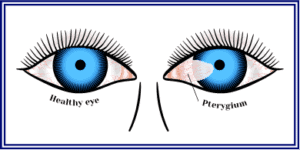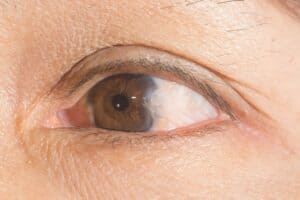Also serving patients in Fort Lauderdale
A pterygium is a tissue growth on the cornea. This condition is more common in sunny climates and in the 20-40 age group. The causes of pterygium to develop are not known. However, since people who have pterygium usually have spent a significant time outdoors, many doctors believe ultraviolet (UV) light from the sun may be a factor, wind and dust as well as genetic predisposition.
Because a pterygium is visible, many people to have it removed for cosmetic reasons. However, your eye doctor may recommend to remove a pterygium when it is invading the cornea or when the discomfort and redness is not relieved by eye drops.
Pterygium surgery is ambulatory with topical anesthetic eye drops. The growth is excised completely. The chance of reoccurrence is greatly diminished due to a special chemical used during the procedure. Most patients go back to their normal activities as soon as two days after surgery. The use of eye drops may be necessary for approximately one month after this procedure.
In addition to providing highly effective pterygium treatment, the experienced surgeons at the Laser Eye Center of Miami specialize in glaucoma surgery, treatment for cataracts, and refractive laser procedures. In fact, the Laser Eye Center’s surgeons are among the most accomplished LASIK eye surgery specialists in Miami and Fort Lauderdale.
Pterygium FAQs
What are the Risk Factors for Pterygium?
 The most significant risk factor for pterygium is excessive UV exposure. This growth is ten times more common in locations near the equator because of higher UV rays, making Florida residents more prone to pterygium. You may be more likely to develop this wedge-shaped growth if:
The most significant risk factor for pterygium is excessive UV exposure. This growth is ten times more common in locations near the equator because of higher UV rays, making Florida residents more prone to pterygium. You may be more likely to develop this wedge-shaped growth if:
- You have a family history of pterygium.
- You live in a tropical or subtropical climate.
- You spend lots of time outdoors.
- You are regularly exposed to wind, dust and other environmental irritants.
- You are a smoker.
- You have a dark skin complexion.
- You are between the ages of 20 and 40.
- You are male. (Men are twice as likely to develop pterygium.)
What are the Symptoms of Pterygium?
Pterygium typically forms on the side of your eye nearest your nose but may develop on the other side and occur in one or both eyes. You may experience multiple growths at a time. The condition progresses slowly for some patients and suddenly for others. The formation of a pinguecula — a yellowish or white bump that grows near the cornea and is made of calcium, fat or protein — may be a precursor to pterygium. The following symptoms may occur with pterygium:
- Feeling like there is something in your eye, causing you to rub and wash your eyes
- A flesh-like growth appears at the corner of the eye and grows into a wing-shape or triangular mass
- Itching or burning eyes from poor lubrication caused by the growth
- Gritty, dry eyes that are worsened by environmental irritants
- Vision changes such as double or blurred vision if the growth extends over the pupil and alters the corneal shape
- Worsening astigmatism, nearsightedness or farsightedness
How is Pterygium Managed and Treated?
Irritating symptoms of pterygium may be managed with lubricating eye drops or artificial tears that moisten the growth and relieve burning or itching eyes. Corticoid steroid eye drops can reduce inflammation and irritation caused by pterygium. Surgeryremoves the growth completely, and the use of Amniotic membrane significantly lower the risk of reoccurring pterygium.
Can Pterygium be Prevented?
 Yes, pterygium may be prevented through protective measures when you are in the sun and exposed to UV rays. Wearing sunglasses that block 99 percent of UVA and UVB light rays can lower your chances of developing the eye growth. Even in overcast weather, you should protect your eyes as UV light passes through the clouds. Wraparound sunglasses are best and protect you from wind, sand and dust in the air. A wide-brimmed hat can protect you from UV rays if you cannot wear sunglasses.
Yes, pterygium may be prevented through protective measures when you are in the sun and exposed to UV rays. Wearing sunglasses that block 99 percent of UVA and UVB light rays can lower your chances of developing the eye growth. Even in overcast weather, you should protect your eyes as UV light passes through the clouds. Wraparound sunglasses are best and protect you from wind, sand and dust in the air. A wide-brimmed hat can protect you from UV rays if you cannot wear sunglasses.
Is Pterygium Cancerous?
No, pterygium is often a benign, harmless eye growth. In rare cases, a pterygium may harbor cancerous cells, which is why you should schedule an eye exam to investigate any changes in your vision or eye health at Laser Eye Center of Miami.
Contact Laser Eye Center of Miami About Pterygium
If you have a pterygium or it’s time for your next eye exam, contact our skilled eye doctors and surgeons at the Laser Center of Miami today to schedule your appointment in Miami or Fort Lauderdale.






